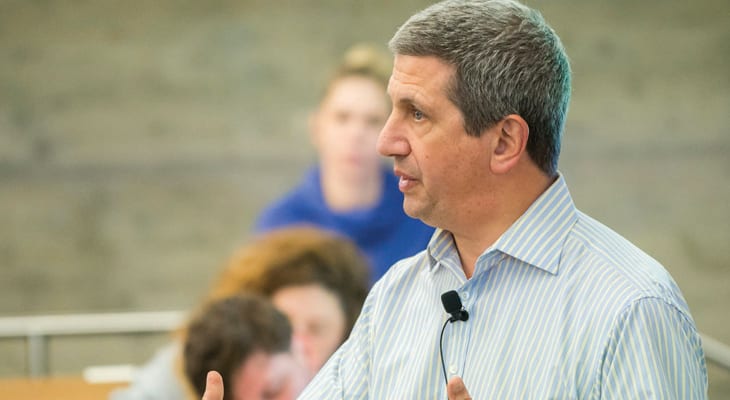Global trade expert Andrew Rose, macroeconomics guru for generations of Haas students, will be a dean at the National University of Singapore

During his 33 years as a Haas professor, Andrew Rose has spent time just about everywhere exceptin an ivory tower. Rose, the Bernard T. Rocca Jr. Chair in International Business & Trade, has made it his mission to marry theory with practice.As a leading expert on global macroeconomics, trade patterns, and exchange rate policy, he has published groundbreakingresearch, worked on six continents, and consulted with policymakers at 15 central banks and most of the world’s major international finance organizations, including the InternationalMonetary Fund and the World Bank. As a citizen of the United States, Canada, and the United Kingdom, he’s a peripatetic scholar who could show up in any part of the world, roll up his sleeves, and dive into the practical economic questions of the day.
This year, Rose is trading his longtime home base of Berkeley for a new post as dean of the business school at the National University of Singapore, one of Asia’s leading centers for the study of finance. Rose’s retirement from Berkeley after the spring semester will bring to a close a Haas career during which he made a lasting mark through teaching, research, and service to the University, includingsix years as Haas’ associate dean for academic affairs from 2010 to 2016. Last year, he was awarded Haas’ highestfaculty honor—the Williamson Award—for his service to the school.
“Andy was extraordinarily effective as associate dean,” says former Haas Dean Rich Lyons, BS 82, who first met Rose when the two were graduate students at MIT. “He was outstandingly successful in negotiations with faculty we wanted to hire who had live offers from peers. And he kept our culture of producing world-class research strong—even making it stronger.”
Rose arrived at Berkeley’s business school in 1986 as a newly minted PhD, hired by Haas economist Janet Yellen. He long taught Haas’ Macroeconomics in the Global Economycourse and was twice a winner of the Earl F. Cheit Award for Excellence in Teaching. In class, he would pepperstudents with Socratic-style questions and press them to apply what they learned to major policy questions.
Recalls Mercedes Broening, EMBA 16, a vice president at First Republic Bank who took Rose’s global macro course, “He had this ability to distill complex macroeconomic ideas into simple terms by using examples the class could understand. He was able to show that a simple decision can have very far-reaching consequences, such as when a countrypegs its currency to another country’s currency.”
Rose works at the interface of international trade and macroeconomics, and his research spans a wide territory, including the consequences of trade blocs and currency unions and how trade relations among countries affect their economic performance. He has investigated exchange rate policies, the impact of removingtrade barriers, and how closer international economic ties affect business cycles.
Some of Rose’s most influential work has involvedstudying policy initiatives such as the EuropeanUnion’s moves to lower barriers to trade and introduce a single currency. One of his most widely cited papers, “One Money, One Market: Estimatingthe Effect of Common Currencies on Trade,” published in 2000—just before the European Union launched the euro—asked what would happen to trade if two countries adopted the same currency.”I found a very positive effect on international trade,” he notes. In addition, Rose was the first economist to carry out a rigorous examination of the impact of the World Trade Organization on trade flows. In a widely reprinted 2004 paper, he concluded that the establishmentof the WTO had little effect.
Rose’s ability to bring economic theory to bearon real-world problemshas made him much in demand in global policy circles. His specialty is advising governmentson how to stabilize nosediving currencies.
Rose’s ability to bring economic theory to bear on real-world problems has made him much in demand in global policy circles. “I’m generally called in to help deal with the crisis du jour,” he jokes. His specialty is advising governments on how to stabilize nosedivingcurrencies, starting in the 1990s when the British Treasury hired him to defend the pound, which was then under attack by speculators. His most well-known assignment was helping the Swedish government decidewhether to adopt the euro (he argued in favor, but Swedish voters rejected the proposal in 2003).
Rose has long-standing ties to Singapore and NUS. He has had several stints as a visiting scholar there and was founding director of the NUS Risk ManagementInstitute in 2006–2007. Rose describes his Haas leave-taking as a bittersweet moment: “Berkeleyis a terrific university and the business school has been great to me,” he says, recalling fondly his close working relationship with Janet Yellen. “How can you ask for something more than that?”